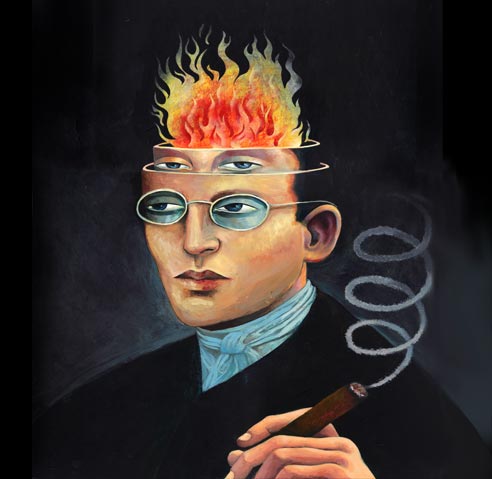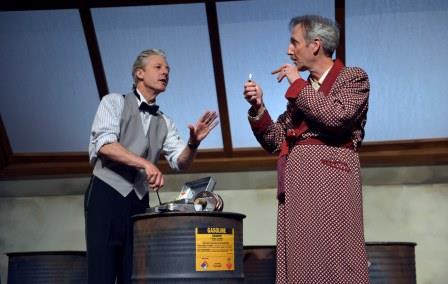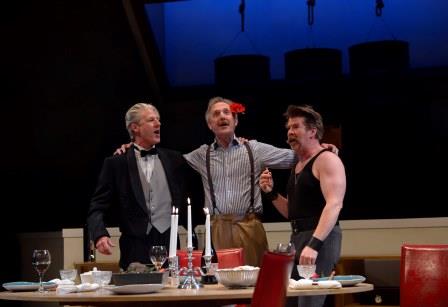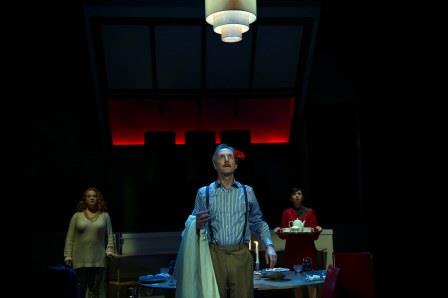April's tragic bombings at the Boston Marathon forced many people to ask an age-old question. Is someone's behavior shaped by nature or nurture? Some of life's tragedies are undeniably due to natural cycles. Two shorts screened at the 2013 San Francisco International Film Festival demonstrated this process with a wry sense of humor.
In Will Rose's delightful The Goat Herder and His Lots and Lots and Lots of Goats, a Spanish goat herder tends to a flock of hungry animals who will eat anything.
In Cicada Princess, Mauricio Baiocchi links a natural phenomenon with a beloved fairy tale, wondering if a cicada who goes to a midnight ball can die happily knowing that she went to sleep with a glass slipper beside her. The following clip from the film's Kickstarter page explains some of the detail that went into creating Cicada Princess (which is drolly narrated by Stephen Fry).
Most children receive lessons in fire safety starting at an early age. They are carefully taught the dire consequences of playing with matches. As they get older, Smokey The Bear becomes an icon associated with fire safety reminders.
Forests are very different environments from industrial, urban, and residential buildings. When one thinks of tragedies that led to increased fire safety standards, among those that quickly come to mind are:
- The P.S. General Slocum fire on June 15, 1904.
- The fire that followed the San Francisco earthquake on April 18, 1906.
- The Triangle Shirtwaist Factory fire of March 25, 1911.
- The disastrous fire aboard the SS Morro Castle on September 5, 1934.
- The SS Normandie fire on February 9, 1942.
- The Texas City disaster of April 16, 1947.
The Texas City inferno was caused when approximately 2,300 tons of ammonium nitrate stored on board the SS Grandcamp was detonated by a smaller fire on board. That disaster was back in the news this Spring following the April 17 explosion of approximately 240 tons of ammonium nitrate at the West Fertilizer Company in West, Texas.
While most of the above-mentioned fires resulted from industrial neglect, a certain number of fires are started by a type of criminal who could be categorized as an enthusiast or "fetishist of the flame." Directed with a grand sense of farce by Mark Jackson, the Aurora Theatre Company in Berkeley recently presented Max Frisch's 1953 play, The Arsonists (more popularly known as Biedermann and the Firebugs or Fire Raisers) using a new translation by Alistair Beaton.

Aurora Theatre Company's poster art for The Arsonists
A Swiss writer who often dealt with the loss of innocence, Frisch was strongly influenced by Bertolt Brecht. Although it's easy to view The Arsonists (which is billed as "A moral play without a moral") as a post-World War II reaction to the rise of Communism, Fascism, and Nazism, the playwright was adamant that his villains are apolitical. As one of the arsonists stresses at the end of the play, "We do it because we like it."
Frisch (who saw his play as a parable) often stressed that "a person who does not concern himself with politics has already made the political choice he was so anxious to spare himself: he is serving the ruling party." His protagonist, Biedermann (Dan Hiatt), is a successful businessman who epitomizes the trusting fool who, more than anything else, dreads someone else's disapproval.

Babette (Gwen Loeb) and Schmitz (Michael Ray Wisely)
in a scene from The Arsonists (Photo by: David Allen)
Appearing smug and sure that he's too smart to be hoodwinked by arsonists who are burning down his city, Biedermann nevertheless demonstrates an acute vulnerability. When introduced to Schmitz (Michael Ray Wisely), an arsonist posing as a homeless man, his double standards quickly come into play. Although he has no qualms about denying a former employee's widow the benefits due her, he will bend over backward to avoid the appearance of being stingy to a total stranger.
As a result, Schmitz and his partner in crime, Eisenring (Tim Kniffin), are soon loading barrels of gasoline into Biedermann's attic. Not only does Biedermann help Eisenring measure the length for a fuse to the detonator, at the end of the play he hands over the matches that will allow Schmitz and Eisenring to burn his house to the ground.

Eisenring (Tim Kniffin) and Biedermann (Dan Hiatt)
in a scene from The Arsonists (Photo by: David Allen)
Before the final conflagration, Biedermann and his wife, Babette (Gwen Loeb), go out of their way to wine and dine the arsonists to the angry astonishment of their maid, Anna (Dina Percia). Throughout the play, a trio of firefighters (Michael Uy Kelly. Kevin Clarke, and Tristan Cunningham) acts as a Greek chorus.
Frisch's play asks audiences to examine why, in the face of a self-identified enemy who makes no bones about his intent to destroy someone's property, a victim would become a willing accomplice to his own destruction. Although performed as a black comedy dripping with irony, The Arsonists is a remarkably timely play.
The question raised by Frisch is a simple one: Does success breed a dangerous combination of complacency and stupidity?
- In 2004, Thomas Frank startled readers of What's The Matter With Kansas? by demonstrating how Middle Americans often vote against their own best interests.
- Many Democrats are furious with the way President Barack Obama and Senate Majority Leader Harry Reid have "negotiated" with Republican leadership.
- Following the Boston bombings, Mike Ferguson wrote a challenging blog post entitled "About That Boston Thing: America, I Have Some Questions."

Eisenring (Tim Kniffin), Biedermann (Dan Hiatt), and Schmitz
(Michael Ray Wisely) celebrate their friendship in The Arsonists
(Photo by: David Allen)
Perhaps the biggest irony I felt after the performance ended was the feeling that Frisch's play could easily have been written about today's Biedermanns: the Log Cabin Republicans. One need only recall Stephen Sondheim's lyrics from 1979's Sweeney Todd, The Demon Barber of Fleet Street:
"City on fire!
Rats in the streets
And the lunatics yelling at the moon!
It's the end of the world! Yes!
City on fire!
Hunchbacks kissing!
Stirrings in the graves
And the screaming of giant winds!
Watch out! Look!
Crawling on the chimneys,
Great black crows screeching at the
City on fire!
City on fire!
City on fire!"
The Aurora Theatre Company's production made fine use of a multi-level set designed by Nina Ball. While Jackson's ensemble worked beautifully to capture the comedic aspects of Frisch's play, I was especially impressed by the performances of Dan Hiatt, Tim Kniffin, and Gwen Loeb. Whether you're a politically-conscious citizen, a smug bastard who thinks that bad things happen to "other people," or a latent firebug, The Arsonists will help you appreciate the fire next time.

The finale of The Arsonists (Photo by: David Allen)
To read more of George Heymont go to My Cultural Landscape
?
Follow George Heymont on Twitter: www.twitter.com/geoheymont
"; var coords = [-5, -72]; // display fb-bubble FloatingPrompt.embed(this, html, undefined, 'top', {fp_intersects:1, timeout_remove:2000,ignore_arrow: true, width:236, add_xy:coords, class_name: 'clear-overlay'}); });
Source: http://www.huffingtonpost.com/george-heymont/city-on-fire_b_3445548.html
nina dobrev nina dobrev HLN Charles Ramsey Mike Jeffries Farrah Abraham Video Michelle Knight
No comments:
Post a Comment